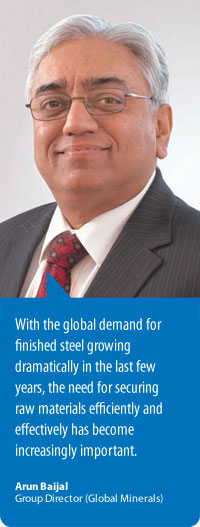Global Minerals – Towards Raw Material Security
Tata Steel’s long term raw material strategy will see the synergies of combined buying come into play. Adding to this is the strategy of having greater control over raw material resources by acquiring ownership of strategic raw materials globally.
The fortunes of the global steel industry have changed dramatically since the start of the new millennium. Due to the recovery and continued growth in most of the major economies of the developed world and the industrialisation of China, demand for finished steel has grown faster in the last few years than it has in the previous decades. The consequent demand for steelmaking raw materials and the means to transport them have created turbulence in markets along the steel value chain and across into shipping, ports and rail infrastructure.
The demand and supply situation resulted in an unprecedented increase in price levels of both iron ore and coal. The supply shortage in coal was further aggravated by the port and rail bottlenecks in Australia; the flooding of the mines in Queensland (which accounts for half of the world’s sea borne trade); the force majeure declared by a number of very high quality coking coal mines in the US; and increasing costs of Canadian coal coupled with equipment shortages. Iron ore prices increased by 400% since 2004 and price of coking coal increased by 500% during the same period.
The mineral and coal sector is now witnessing increased vigorous Merger and Aquisition activity, in a bid by mining companies to further consolidate their position; and by users to backward integrate for hedging against volatility and securing inputs.
Global raw material scenario
Raw Material Security
Tata Steel meets all of its current iron ore and 60% of its coal requirement for Indian operations from its own mines.
While Tata Steel’s standalone raw material security is 80%, it was 22% for the Tata Steel Group in 2007. In the next three
to five years, the raw material security of Tata Steel standalone will reach 40% with the expansion of the Jamshedpur
plant and with the Kalinganagar project coming on stream. It has therefore become imperative for Tata Steel to
aim towards attaining a significant level of raw material security, thereby insulating the Company from the forces of
market which is dominated by only a few companies.
Guiding Philosophy
In line with its strategy of backward integration, the Tata Steel Group is exploring various raw material opportunities
across the globe guided by the following principles:
- Political and socio-economic condition of the countries/regions
- Resource size and quality
- Logistics and infrastructure
- Proximity either to European or Indian operations
- Expected timeline for execution of the project
Geographies
The Tata Steel Group has identified the potential geographies of Americas, Western and Southern Africa and Australia,
in addition to India, in its search for iron ore and coal.
Strategy
The Tata Steel Group has adopted a two pronged strategy:
- To look for participation in the early stage of a project i.e. in exploration / pre-feasibility stage.
- To look for opportunities which could give the Group immediate offtake.
Actions taken
In keeping with the Group Raw Material Strategy, the Tata Steel Group has finalised the following agreements:
Carborough Downs Joint Venture, Australia, July 2005 – Tata Steel had signed agreements to buy a 5% interest in the Carborough Downs Coal Project located in Queensland, Australia. Tata Steel also signed an offtake agreement for a proportion of the production over life of the project. Tata Steel and Vale, along with other joint venture partners have recently initiated a large scale expansion of the Carborough Downs Coal Mine.
Riversdale, Mozambique, November 2007 – The Tata Steel Group entered into definitive agreements with Riversdale Mining Limited for 35% stake in Mozambique Coal Project for a purchase consideration of USD 84 million. The Group will have right to 40% offtake for the coking coal. Feasibility studies for the project are in progress and completion is expected by September 2008.
Ivory Coast – Iron Ore Deposits, December 2007 – The Group entered into a Joint Venture with Sodemi for 85% stake for the development of an Iron Ore project in Cote d’Ivoire, with Sodemi holding a 15% stake. On the mining lease being granted, the State will earn a 10% interest and the Group’s interest will be reduced to 75%. The company, Tata Steel Cote d’Ivoire has been formed and the exploration and feasibility studies are to commence.
Oman Limestone Project, January 2008 – The Tata Steel Group entered into a Joint Venture agreement with shareholders of Al Rimal Mining LLC for a 70% stake in the company. An exploration license for an area of 25 square kilometers has been granted to the Joint Venture and the exploration and feasibility studies are to commence shortly.


 The fortunes of the global steel industry have changed dramatically since the start of the new millennium. Due to the
recovery and continued growth in most of the major economies of the developed world and the industrialisation of
China, demand for finished steel has grown faster in the last few years than it has in the previous decades. The consequent
demand for steelmaking raw materials and the means to transport them have created turbulence in markets along the
steel value chain and across into shipping, ports and rail infrastructure.
The fortunes of the global steel industry have changed dramatically since the start of the new millennium. Due to the
recovery and continued growth in most of the major economies of the developed world and the industrialisation of
China, demand for finished steel has grown faster in the last few years than it has in the previous decades. The consequent
demand for steelmaking raw materials and the means to transport them have created turbulence in markets along the
steel value chain and across into shipping, ports and rail infrastructure.